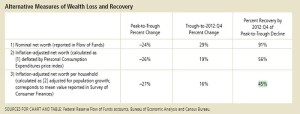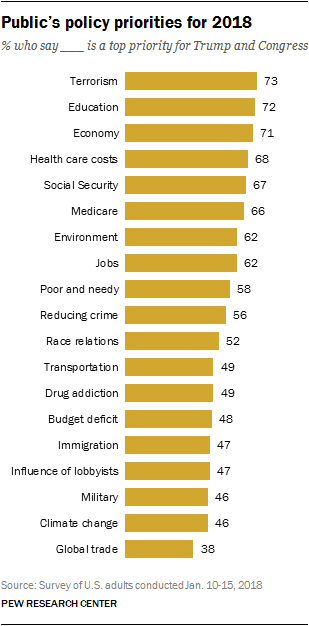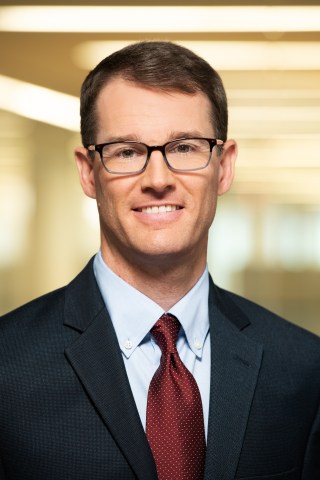


Over the course of more than 15 years and three presidential administrations, Americans have consistently said that defending the nation against terrorism should be a top policy priority for the White House and Congress, according to Pew Research Center surveys conducted since shortly after the attacks of Sept. 11, 2001.
In January of this year, 73% of U.S. adults said defending the country against future terrorist attacks should be a top priority for President Donald Trump and Congress – making this one of the most frequently cited priorities, along with improving the educational system (72%) and strengthening the nation’s economy (71%).
Other issues have risen and fallen as public priorities over the years. Economic concerns such as improving the job situation and reducing the federal budget deficit have generally receded since 2010, while growing shares of Americans have prioritized other areas, such as protecting the environment, dealing with climate change and reducing health care costs.
But the share that sees defending against terrorism as a top priority has remained fairly steady: Around seven-in-ten Americans or more have cited it as a top priority in 17 surveys conducted by the Center since January 2002 (the first time the question was asked), when 83% of Americans cited it.
For most of the post-9/11 era, Republicans have been more likely than Democrats to say defending the nation against terrorism should be a top priority for the president and Congress, and that remained the case this year. In January, 89% of Republicans said this, compared with 64% of Democrats. (These figures exclude independents who lean to one party or the other.)
The two parties were much closer on this question in the aftermath of the attacks: In January 2002, 90% of Republicans and 82% of Democrats said then-President George W. Bush and Congress should prioritize defending the nation from future attacks.
Americans’ ongoing concerns about terrorism are also reflected in their views toward the balance between homeland security and civil liberties.

In a survey conducted in fall 2016, about half of U.S. adults (49%) said the bigger concern about the government’s anti-terrorism policies is that they have not gone far enough to adequately protect the country, while a third said the bigger concern is that they have gone too far in restricting the average person’s civil liberties.
Since 2004, Americans have generally expressed more concern about the government’s policies not going far enough than about civil liberties. Yet the reverse was true in 2013, shortly after leaks of classified information about government surveillance by former National Security Agency contractor Edward Snowden. In two surveys that year, Americans were more likely to say the government was going too far in restricting civil liberties than not going far enough to protect the nation.
Related: How Americans have viewed government surveillance and privacy since Snowden leaks
Republicans have generally been more likely than Democrats to say the bigger concern about the government’s anti-terrorism policies is that they don’t go far enough to protect the country. This has been especially true in recent years: In the fall 2016 survey, around two-thirds of Republicans (68%) said the government’s policies don’t go far enough – tied for the highest share holding that view since 2004. Fewer Democrats said the same (46%).
Partisan differences about terrorism are also evident when it comes to federal spending priorities. In an April 2017 survey, Republicans and Republican-leaning independents were about twice as likely as Democrats and Democratic leaners (61% versus 33%) to say they would increase federal spending on anti-terrorism defenses in the U.S.
Overall, 46% of U.S. adults said they would increase spending on anti-terrorism defenses. That was the highest share recorded in five Pew Research Center surveys since February 2002, when 63% of Americans said they would increase federal spending on anti-terrorism.
